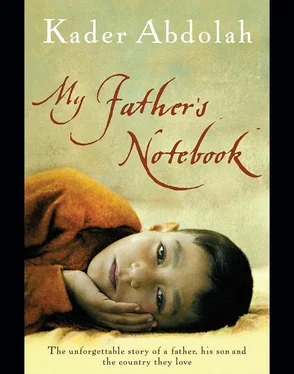It didn’t take long. She struck a match and signed, “Go and get the oil lamp … No, wait, a candle is better.”
Akbar trotted off and came back with a candle stub. Tina lit it and went into the lean-to.
“Where are they?”
“I’m not sure. I didn’t take much notice.”
Holding the candle in one hand, Tina groped around with the other until she came upon a stack of papers in a cardboard box. She held one of them up to the candle and read a few lines. It didn’t make any sense to her, but she could see that it was a flyer. She thrust it into Akbar’s hand. “How could you be so stupid?” she angrily signed. “Stupid, stupid, stupid!”
She got down on her knees and searched some more. She pulled a typewriter out from under a table. “How will I ever be able to get rid of this? Oh, Akbar, Akbar, you’re ruining my life!”
Tina crawled through the darkness on her hands and knees. Behind a wooden box she found a few cans of spray paint. It was the first time she’d ever seen graffiti spray. She carefully picked up a can and examined it in the dim candlelight. “What on earth is this? Oh, my God, stay back, Akbar! Don’t touch the thing, it might explode! Get me a plastic bag. OK, now put it in the bag. No, wait, I’d better do it myself.”
She picked up the cans one by one and put them in the bag. “Golden Bell,” she moaned, “you’ve not only ruined your life, but also mine.”
Then she turned to Akbar. “Hurry up! Where’s my chador? I’ll take the papers, you take the typewriter. Hide it under your coat. Or wrap it in a rag. No, a carpet. Hurry! I’ll carry those dangerous-looking cans. Now go! Follow me down to the river!”
It was light outside, though the sun hadn’t come up yet.
By the bakery they ran into some men hurrying home with fresh bread.
“Salaam aleikum!”
“Salaam aleikum!”
Tina turned down a side street, towards a grape arbor, and Akbar trailed along behind her. Fifteen minutes later they came to the river.
Tina hunted around and found a heavy rock, which she put in the box of flyers. She took off her headscarf, tied it around the box and lowered it into the water. Then she gingerly picked up the bag of spray cans. She filled the bag with water, tied it shut and pushed it gently away from the shore. It floated briefly along with the current, then sank.
“Don’t just stand there!” she snapped at Akbar. “Throw the typewriter in, too!”
But Akbar couldn’t bring himself to do it. He hesitated.
So Tina picked up the typewriter, walked down to the river’s edge and threw it as far as she could. It splashed noisily into the water, but Tina fell to her knees. “Ow, my back!” she cried. “Come here, Akbar! Hold my hand! I can’t breathe. No, don’t touch me, don’t come near me. Golden Bell, look what you’ve done to me!”
She began to cry. After several minutes, she was finally able to stand up again, with Akbar’s help. She held his arm and they slowly made their way home.
At eleven o’clock that same morning, two agents of the secret police walked into Akbar’s shop. Akbar hadn’t felt up to going that morning, but Tina had insisted: “Go to the shop as usual and do your work. We mustn’t do anything out of the ordinary, or people will realise that Golden Bell didn’t come home last night.”
Akbar was sitting at his workbench when the shadows of the two men fell across the carpet he was mending. Startled, he raised his head and began to stand.
“Don’t get up,” one of them gestured.
Akbar sensed that these were the men Tina had been talking about. The other agent went around the shop, inspecting things. He moved aside the carpets on the workbench and peered into a box on the shelf.
“Your daughter, the girl who helps you in the shop, where is she?” the agent asked, in rudimentary sign language.
Despite the man’s clumsy signs, Akbar knew what he meant.
“What did she do in your shop?” the agent continued.
“I don’t know what you’re talking about,” Akbar signed.
“Your daughter,” the agent gestured more emphatically. “Daughter, earrings. Green earrings. Long hair. Breasts. You understand? What did she do here? Who else came to your shop?”
Akbar knew he wasn’t supposed to say anything, but he was upset by the man’s crude gestures. It was Golden Bell’s long hair and green earrings he was describing. He must have seen her without her chador. Surely that was impossible?
Though Akbar was inwardly seething, he managed to sit calmly in his chair.
“He doesn’t understand what you’re talking about,” the other agent said.
“He understands all right. Show him the photographs.”
The other agent went into the lean-to.
The first agent took a couple of pictures out of his coat pocket. He thrust the picture of a man in front of Akbar’s face. “Do you know this man?”
“I don’t understand. Let me get my wife.”
“Sit down. Look at this picture. Have you ever seen this man in your shop? Did he have any contact with your daughter? Did he—”
“I don’t understand. You have to send for my wife,” Akbar gestured for the second time.
“I bet you’ll understand now. Here’s another picture. I’m sure you’ll recognise her ,” he said with a smirk. And he showed him a picture of Golden Bell with her hair in a tangle and her face covered with cuts and bruises.
That did it. The man had violated the inviolable. Akbar snatched the picture out of his hand, leapt to his feet and pushed the man aside.
The agent backed up a few steps, pulled out a gun and yelled, “Sit down!” But that only made things worse. Akbar grabbed a stick and started hitting him, shrieking all the while, “GEEEEE OUOUOU!”
The other agent rushed out of the lean-to and was about to grab Akbar from behind, when Akbar wheeled around and whacked him on the shoulder with his stick. The agent doubled over in pain.
Akbar hurried outside and began shouting: “MYYYY GOOLGOOL EAEAEAR RRRGGG!”
Shopkeepers raced outside and passers-by rushed to his aid. “What’s wrong?”
“In there. Those men. A picture. Golden Bell. Her hair. Her earrings,” he gestured.
No one knew what he was talking about.
The situation had got completely out of hand. The hated agents of the secret police slinked off to their car and disappeared.
The shopkeepers took Akbar back to his shop.
“What did they want?”
“That man had a picture in his pocket. Golden Bell’s long hair. Her green earrings. And her … How could he have seen her green earrings? Do you understand?”
“No,” said the grocer.
“Golden Bell didn’t come home, I mean, she got home late last night, but my wife can tell you more. And that man pulled out a gun. He had the picture in his pocket. Suddenly I got angry, I picked up a stick and hit him. The other agent was about to grab me from behind. I hit him hard on his … the picture, where’s the picture?”
“I think we’d better get his wife,” the baker said. “He’s upset about something.”
• • •
Ishmael phoned a few more times, but Tina couldn’t bring herself to tell him that Golden Bell was in prison. Instead, every time he called, she told him that Golden Bell just happened to be away at that moment.
“Tina, it’s hard for me to phone. I can’t do it often. I’ll try again tomorrow evening at around seven,” he finally said. “Tell Golden Bell, because I want to talk to her. And can you ask Father to come home earlier tomorrow night? I want to hear his voice. He’s all right, isn’t he?”
“We’re old. Some days are better than others. But he’s doing fine. He’s working the same long hours he always has.”
Читать дальше












